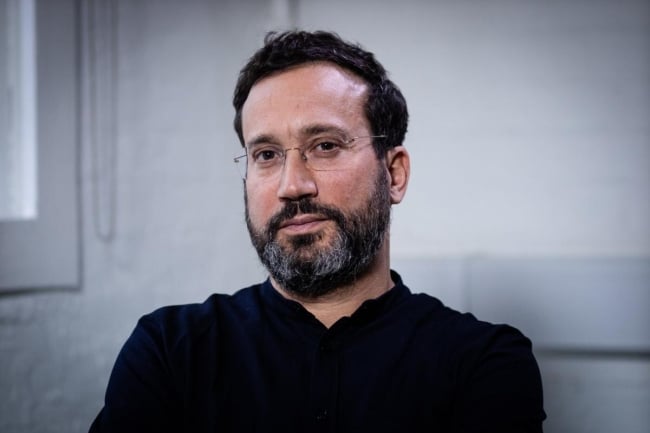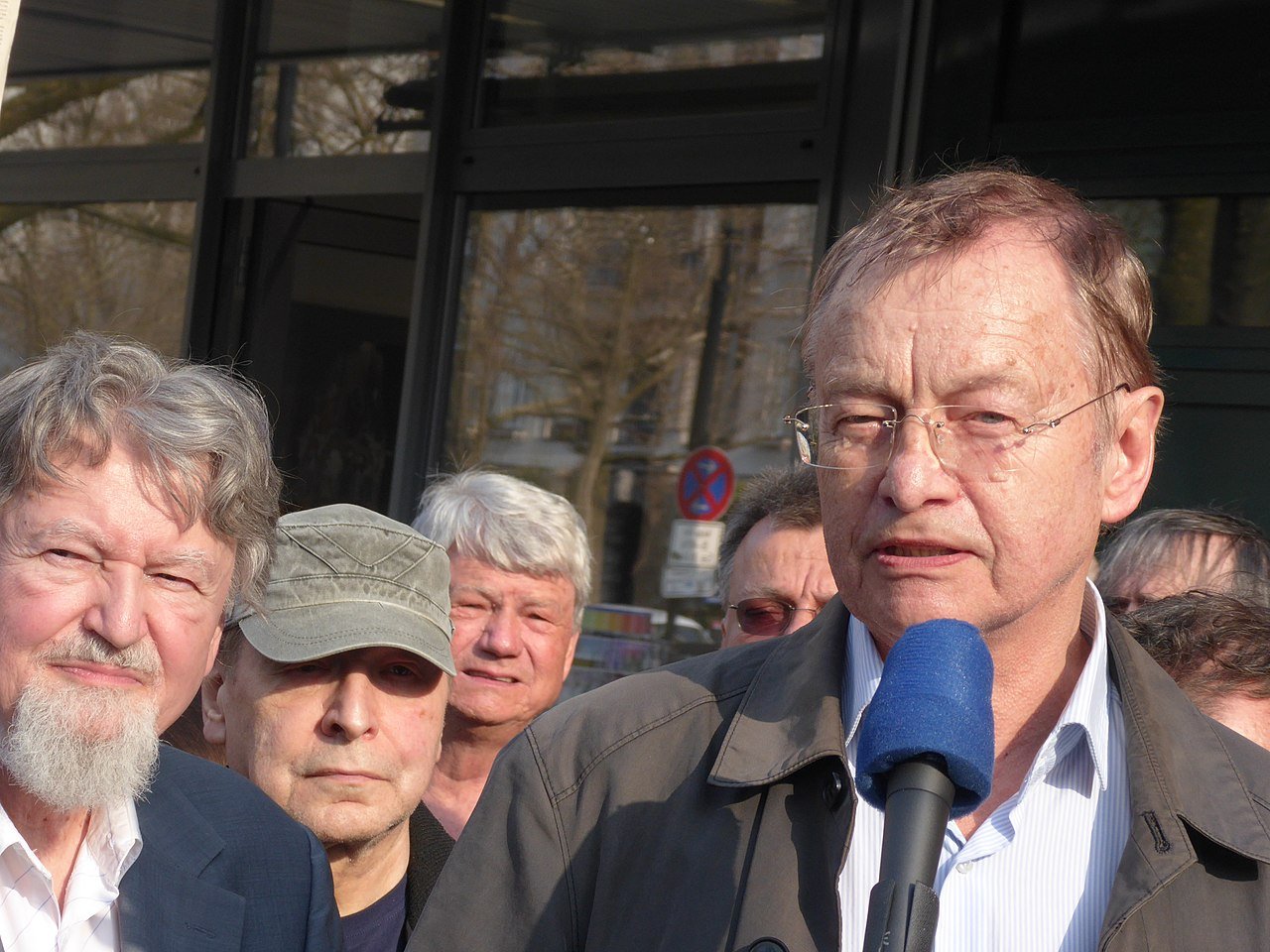You have /5 articles left.
Sign up for a free account or log in.

Eyal Weizman
Forensic Architecture
Two Europe-based professors delayed or canceled their trips to the U.S. recently due to problems getting approved for visas. Their experiences are renewing concerns about obstacles put in the way of highly renowned scholars wanting to travel to the U.S. because of their political affiliations and activities or their travel histories.
Both cases came to light last week. In the first case, first reported by the University of Virginia student newspaper, a German professor and expert on far-right politics, Hajo Funke, scheduled to teach two classes at Virginia couldn’t make it to the U.S. for the start of the spring semester after he says his visa application was held up by U.S. immigration authorities. The other case involves a Britain-based professor and architect, Eyal Weizman, who was unable to make it to the opening of an exhibition of his work at Miami Dade College’s Museum of Art and Design after he says his eligibility for visa-free travel to the U.S. was abruptly canceled.
A supporter of Funke believes his past travel to Iran to visit his wife's family is the most likely reason for the delay. Weizman said something about his travels or associations flagged him for additional scrutiny and said U.S. Embassy officials in London told him as much.
These incidents follow a series of others in which students from the Middle East, in particular Iran, have experienced delays getting visas or have been denied entry at U.S. airports despite having been awarded visas to travel.
“What we think is the processing has become much more severe,” said Jeffrey Grossman, an associate professor and chair of Germanic languages and literatures at UVA who invited Funke to teach two courses at the university this semester. One of the courses is on right-wing populism and the far right, and the other is on political and historical memory. The classes are being taught via videoconferencing while Funke continues to wait for his visa.
A Delayed Visa, a Diminished Classroom Experience
Funke said he applied for an exchange visitor visa in November and was told in December that it would be subject to three to six months of additional processing. He said he was not given a reason for the delay. He was most recently in the U.S. in the fall of 2018 as a research fellow at Johns Hopkins University’s American Institute for Contemporary German Studies, where he worked on a comparative project addressing the white supremacist rally in Charlottesville, Va., in August 2017 and far-right protests in the German city of Chemnitz in August and September of 2018.
“A year and some months ago, I got the visa without problems, and now I didn’t with the same identical passport,” Funke said in an interview. “So they had changed the rules or it was in other ways arbitrary.”
Funke stressed that he did not want to speculate why his visa application was denied. But he noted that his passport has a stamp from his 2014 trip to visit his wife's family in Iran, and that same stamp was in the passport the last time he applied for and got a U.S. visa.
 A U.S. State Department official declined to comment on Funke's case, citing the confidentiality of visa records under U.S. law.
A U.S. State Department official declined to comment on Funke's case, citing the confidentiality of visa records under U.S. law.
“Speaking generally, national security is our top priority when adjudicating visa applications,” the official said. “Every prospective traveler to the United States undergoes extensive security screening, and we are constantly working to find mechanisms to improve our screening processes and to support legitimate travel and immigration to the United States while protecting U.S. citizens.”
Funke said he received word on Thursday from the U.S. Embassy in Germany that his visa had been approved and that he must now mail his passport back to the embassy to get the visa. Meanwhile, the courses he is teaching at Virginia are underway via videoconferencing, with the help of Grossman.
"It is functioning very well, with one exception: the personal face-to-face contact isn’t possible if you don’t know the students. This specific lack of kind of quasi-personal scholarly exchange, that was the minus," Funke said.
Grossman agreed the videoconferencing is no substitute for teaching in person. He thinks the classes would have had higher enrollments had Funke been there in person starting the first day of classes.
“He likes very much engaging with students; he’s very personable even in a videoconference, because he’s appeared on German television and radio, but you can just sense that if he were in the classroom, it would be even more stimulating for the students,” Grossman said.
Grossman said Funke is exceptionally well positioned to address topics of great relevance to UVA students.
“We really wanted to offer classes that the students would find relevant given what’s happened in Charlottesville,” he said. “We’re very concerned to address these issues as they impinge on our world and given his focus -- that he does know Charlottesville and also works on Germany and political theory -- we thought that would be a great way to address that.”
A Disrupted Exhibition, a Mysterious ‘Algorithm’
In Weizman's case, the professor of spatial and visual cultures at Goldsmiths, University of London, was planning to travel to Miami for the opening of an exhibition last week at a museum affiliated with Miami Dade College.
The exhibit features the work of Forensic Architecture, a research agency founded and directed by Weizman that, per the exhibit description, “uses architectural software and an architectural sensibility to investigate human rights violations.”
“We investigate state and corporate violence, human rights violations and environmental destruction all over the world,” Forensic Architecture’s website explains. “Our work often involves open-source investigation, the construction of digital and physical models, 3D animations, virtual reality environments and cartographic platforms. Within these environments we locate and analyze photographs, videos, audio files and testimonies to reconstruct and analyze violent events. We also use our digital models as tools for interviewing survivors of violence, finding new ways to access and explore memories of trauma.”
The exhibition at Miami Dade College’s Museum of Art and Design is Forensic Architecture’s first major survey exhibition in the U.S., and Weizman planned to be in attendance. But he said in a statement that he received an email from the U.S. embassy on Feb. 12, two days before his scheduled flight to the U.S., saying his eligibility for travel through the visa waiver program had been revoked. The visa waiver program allows for visa-free short-term travel to the U.S. for citizens of 39 countries, including many European nations.
“The revocation notice stated no reason, and the situation gave me no opportunity to appeal or to arrange for an alternative visa that would allow me be here,” Weizman said. His wife, who is also a professor and was scheduled to give talks in the U.S., traveled ahead with their two children without him. Weizman said she was stopped upon arrival at New York's John F. Kennedy Airport, separated from the children and interrogated for two and a half hours by immigration officials before the family was allowed entry.
"The following day I went to the U.S. Embassy in London to apply for a visa," Weizman said. "In my interview the officer informed me that my authorization to travel had been revoked because the 'algorithm' had identified a security threat. He said he did not know what had triggered the algorithm but suggested that it could be something I was involved in, people I am or was in contact with, places to which I had traveled (had I recently been in Syria, Iran, Iraq, Yemen or Somalia or met their nationals?), hotels at which I stayed or a certain pattern of relations among these things. I was asked to supply the Embassy with additional information, including 15 years of travel history, in particular where I had gone and who had paid for it. The officer said that Homeland Security’s investigators could assess my case more promptly if I supplied the names of anyone in my network whom I believed might have triggered the algorithm. I declined to provide this information."
A spokesperson for U.S. Customs and Border Protection, which administers the visa waiver program, said the agency uses "a multilayered approach to security."
"CBP officers have the statutory authority to refer any individuals for additional screening about whom we need more information to make a determination of risk on such things as health-related grounds, national security concerns, intending immigration without proper authorization, criminality, document requirements or violations and many more. These referrals are based on multiple factors that could include a combination of an individual’s activities, associations and travel patterns," the agency spokesperson said.
Weizman said his work in human rights engaging with vulnerable individuals makes him especially alarmed about the monitoring of his associations and travel patterns.
"This much we know: we are being electronically monitored for a set of connections -- the network of associations, people, places, calls and transactions -- that make up our lives," he said in his statement. "Such network analysis poses many problems, some of which are well-known. Working in human rights means being in contact with vulnerable communities, activists and experts, and being entrusted with sensitive information. These networks are the lifeline of any investigative work. I am alarmed that relations among our colleagues, stakeholders and staff are being targeted by the U.S. government as security threats."
Weizman used the occasion of the exhibition opening to announce an investigation with local groups into an immigration detention center in Homestead, Fla. Of his own encounters with U.S. immigration, he said, "This incident exemplifies -- albeit in a far less intense manner and at a much less drastic scale -- critical aspects of the 'arbitrary logic of the border' that our exhibition seeks to expose. The racialized violations of the rights of migrants at the U.S. southern border are of course much more serious and brutal than the procedural difficulties a U.K. national may experience, and these migrants have very limited avenues for accountability when contesting the violence of the U.S. border."




